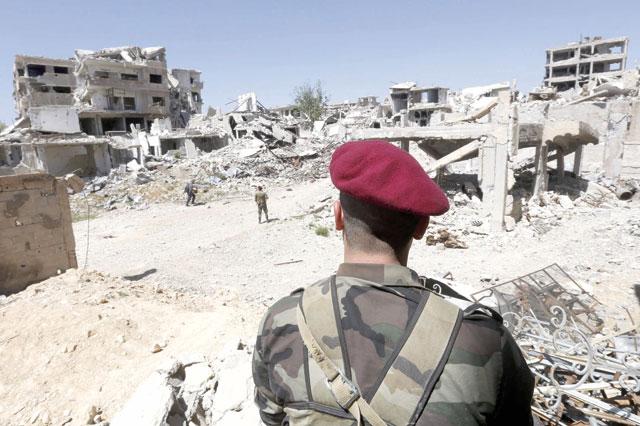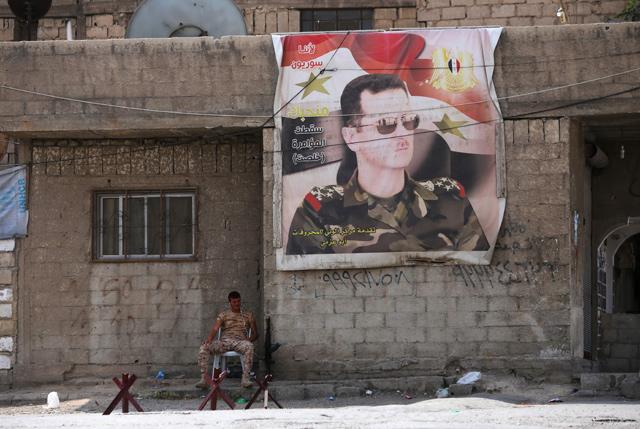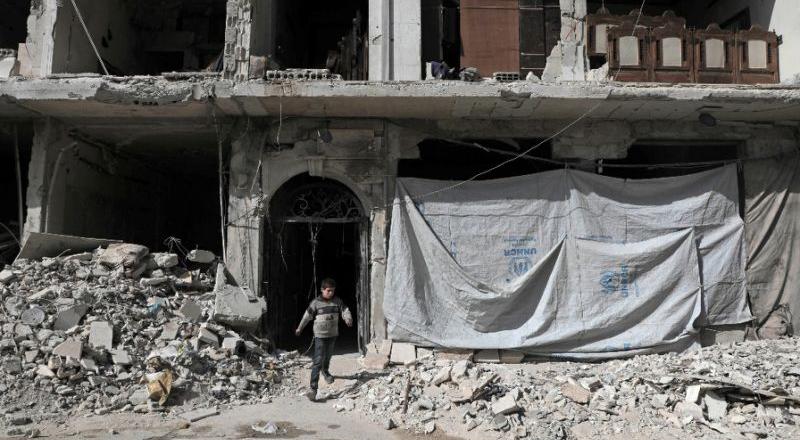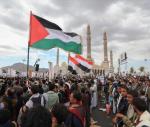You are here
More evacuees leave Syria’s Ghouta as regime eyes reconquest
By AFP - Apr 04,2018 - Last updated at Apr 04,2018
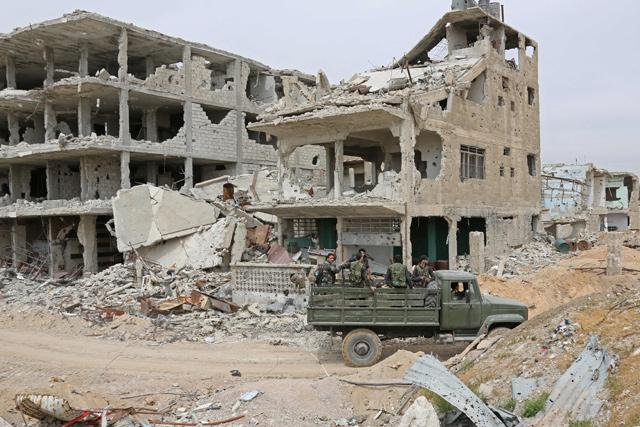
Pro-government forces drive past destroyed buildings in the recently conquered area of Jobar, in Eastern Ghouta, on Tuesday (AFP photo)
WAFIDEEN CHECKPOINT, Syria — Buses carrying Syrian civilians and rebels began leaving the last opposition holdout in Eastern Ghouta on Tuesday on a second day of evacuations, as the regime eyed the total reconquest of the enclave.
Evacuations of Jaish Al Islam fighters and their families from the former rebel bastion’s main town of Douma started on Monday under a Russia-brokered deal.
Jaish Al Islam has not, yet, confirmed the accord, amid reports hardliners within the group were refusing to leave their positions.
The reported deal is the latest in a string of agreements that have seen tens of thousands of people — rebels and civilians — leave the onetime stronghold outside Damascus for the north of the country.
Russia-backed regime forces have retaken control of 95 per cent of Eastern Ghouta since February 18 through a combination of a deadly air and ground assault and evacuation deals.
The recapture of Eastern Ghouta would mark a major milestone in President Bashar Assad’s efforts to regain control of territory seized by rebels during Syria’s seven-year civil war.
An AFP correspondent saw six buses carrying people leave the enclave on Tuesday via the regime-held Wafideen checkpoint.
A woman and small child peered out of a bus window, a teddy bear backpack lodged beside their seat. Cracks spread from a hole in the windscreen of one bus.
State news agency SANA said “a number of buses” carrying Jaish Al Islam fighters and their family members had exited through the checkpoint.
In previous evacuations, buses leaving Douma have gathered near Wafideen or on the side of the motorway outside Damascus, and waited for hours for others to join them before setting off as a full convoy to northern Syria.
‘Will not leave’
In a first wave of evacuations of Jaish Al Islam fighters from Douma, more than 1,100 people — rebels and family members — set off late Monday to the rebel-held town of Jarabulus in northern Syria, SANA said.
The Britain-based Syrian Observatory for Human Rights monitoring group, which relies on sources on the ground, said earlier on Tuesday that divisions continued within the rebel group.
“There is still a hardline wing in Jaish Al Islam that refuses the deal,” observatory chief Rami Abdel Rahman said.
Jaish Al Islam has around 10,000 fighters in its ranks, the observatory says.
In video footage published by the group online on Sunday, leader Essam Al Buidani told men in a mosque: “We will stay in this town and will not leave.”
But “those who want to leave should leave”, he said.
Monday’s evacuation came after more than 46,000 people — including fighters from other areas of Eastern Ghouta — left on buses to the northwestern province of Idlib, the last in Syria to remain largely outside regime control.
Backed by Russia, Assad’s forces have scored a series of victories over rebel forces in recent years, often through campaigns of siege, aerial bombardment and ground offensives that have drawn widespread international condemnation.
Before February 18, some 400,000 people in Eastern Ghouta had lived under regime siege for five years, facing severe food and medicine shortages.
‘Spider’s web’
The regime assault on Eastern Ghouta since mid-February has killed more than 1,600 civilians and caused tens of thousands to flee into regime-held territory.
Aid workers have criticised the living conditions in the temporary camps in government-controlled territory receiving the displaced.
On Tuesday, SANA quoted a military source as saying more than 40,000 people have returned to their homes in areas of the former rebel enclave.
Syria’s war has killed more than 350,000 people and displaced millions since starting in 2011 with the brutal repression of anti-government protests.
Numerous rounds of UN-backed talks have failed to stem the fighting, which has spiralled into a complex conflict involving world powers.
On Wednesday, the leaders of Russia, fellow regime supporter Iran and rebel-backer Turkey are to meet for a summit devoted to Syria.
The meeting between Russia’s President Vladimir Putin, Iran’s President Hassan Rouhani and their Turkish counterpart Recep Tayyip Erdogan is to be held in Ankara.
Eastern Ghouta lies within mortar range of the capital, and last month the deadliest rebel rocket attack on the capital in months killed 44 civilians.
Rebels have left behind a labyrinth of tunnels under Eastern Ghouta, fitted with hospitals and military headquarters, and some of them wide enough to drive a car through.
A Syrian army official who escorted journalists on a visit on Monday described them as “a real spider’s web”.
SANA said the military found two underground field hospitals, equipped with medical equipment and medicine.
Related Articles
DAMASCUS, Syria — Syria's regime drew closer to taking full control of Eastern Ghouta on Monday as state media reported that fighters began
WAFIDEEN CHECKPOINT, Syria — Rebels in Syria’s Eastern Ghouta surrendered their heavy weapons and their leader left the enclave, a monitor s
Beirut - Syrian regime ally Russia struck a deal with rebels to evacuate hundreds of civilians from Douma, the final opposition pocket in th


